Managing Quality in Travelodge: A Detailed Analysis
VerifiedAdded on 2022/12/27
|12
|3398
|90
Report
AI Summary
This report provides a comprehensive analysis of quality management within Travelodge, a major UK hotel brand. It begins by defining quality management and its importance in the tourism and hospitality sector, highlighting the benefits such as improved service standards and customer satisfaction. The report then delves into the specific quality management issues currently faced by Travelodge, including deficiencies in employee training, resistance to change, and limitations in management experience and resources. It explores the impact of benchmarking, particularly against competitors like Premier Inn, and discusses the advantages and disadvantages of this approach. The report also presents recommendations for improvement, including the use of KPIs and other quality management techniques, to enhance customer service, employee performance, and overall operational efficiency. The report emphasizes the importance of continuous improvement, customer focus, and employee engagement in achieving long-term success and maintaining a competitive advantage in the hospitality industry.
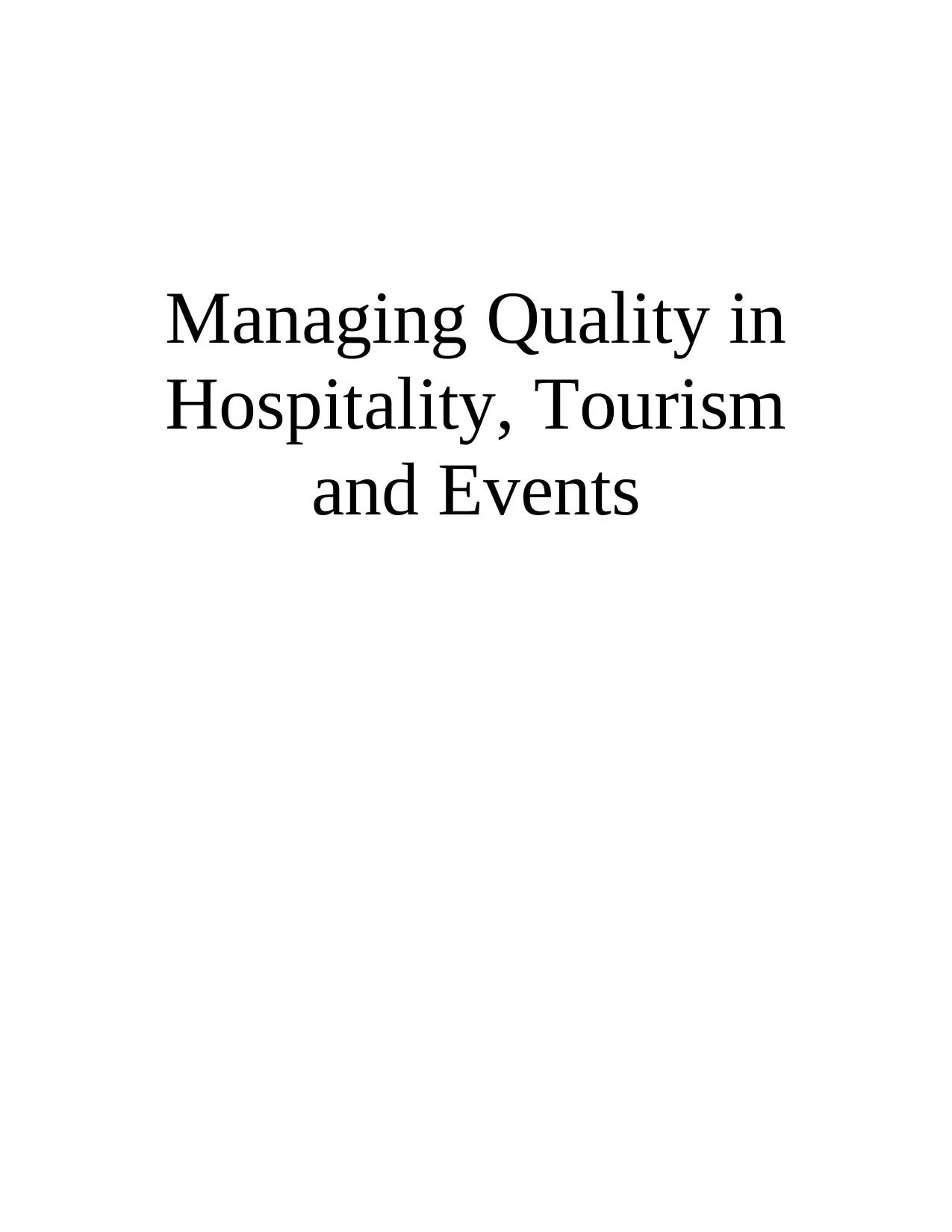
Managing Quality in
Hospitality, Tourism
and Events
Hospitality, Tourism
and Events
Paraphrase This Document
Need a fresh take? Get an instant paraphrase of this document with our AI Paraphraser
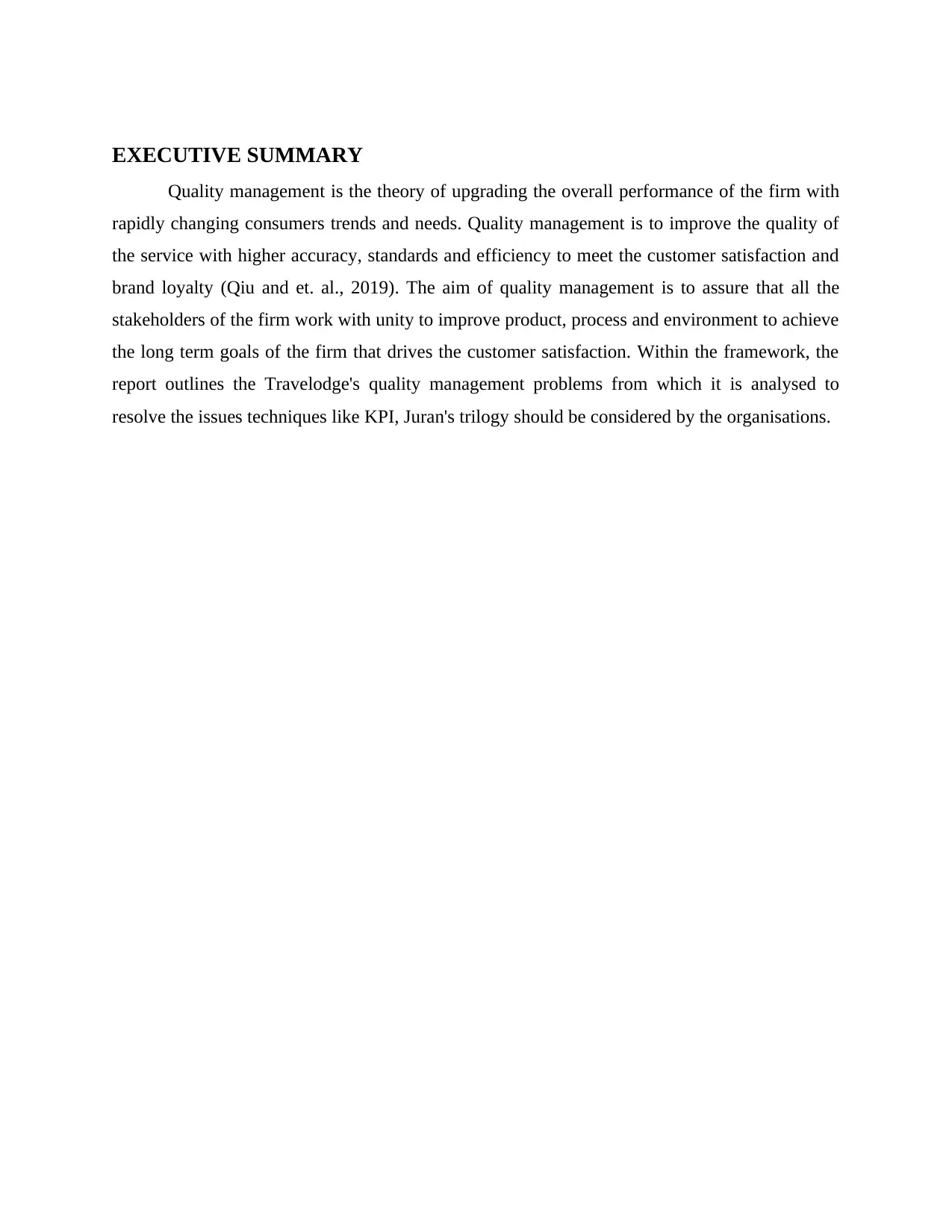
EXECUTIVE SUMMARY
Quality management is the theory of upgrading the overall performance of the firm with
rapidly changing consumers trends and needs. Quality management is to improve the quality of
the service with higher accuracy, standards and efficiency to meet the customer satisfaction and
brand loyalty (Qiu and et. al., 2019). The aim of quality management is to assure that all the
stakeholders of the firm work with unity to improve product, process and environment to achieve
the long term goals of the firm that drives the customer satisfaction. Within the framework, the
report outlines the Travelodge's quality management problems from which it is analysed to
resolve the issues techniques like KPI, Juran's trilogy should be considered by the organisations.
Quality management is the theory of upgrading the overall performance of the firm with
rapidly changing consumers trends and needs. Quality management is to improve the quality of
the service with higher accuracy, standards and efficiency to meet the customer satisfaction and
brand loyalty (Qiu and et. al., 2019). The aim of quality management is to assure that all the
stakeholders of the firm work with unity to improve product, process and environment to achieve
the long term goals of the firm that drives the customer satisfaction. Within the framework, the
report outlines the Travelodge's quality management problems from which it is analysed to
resolve the issues techniques like KPI, Juran's trilogy should be considered by the organisations.
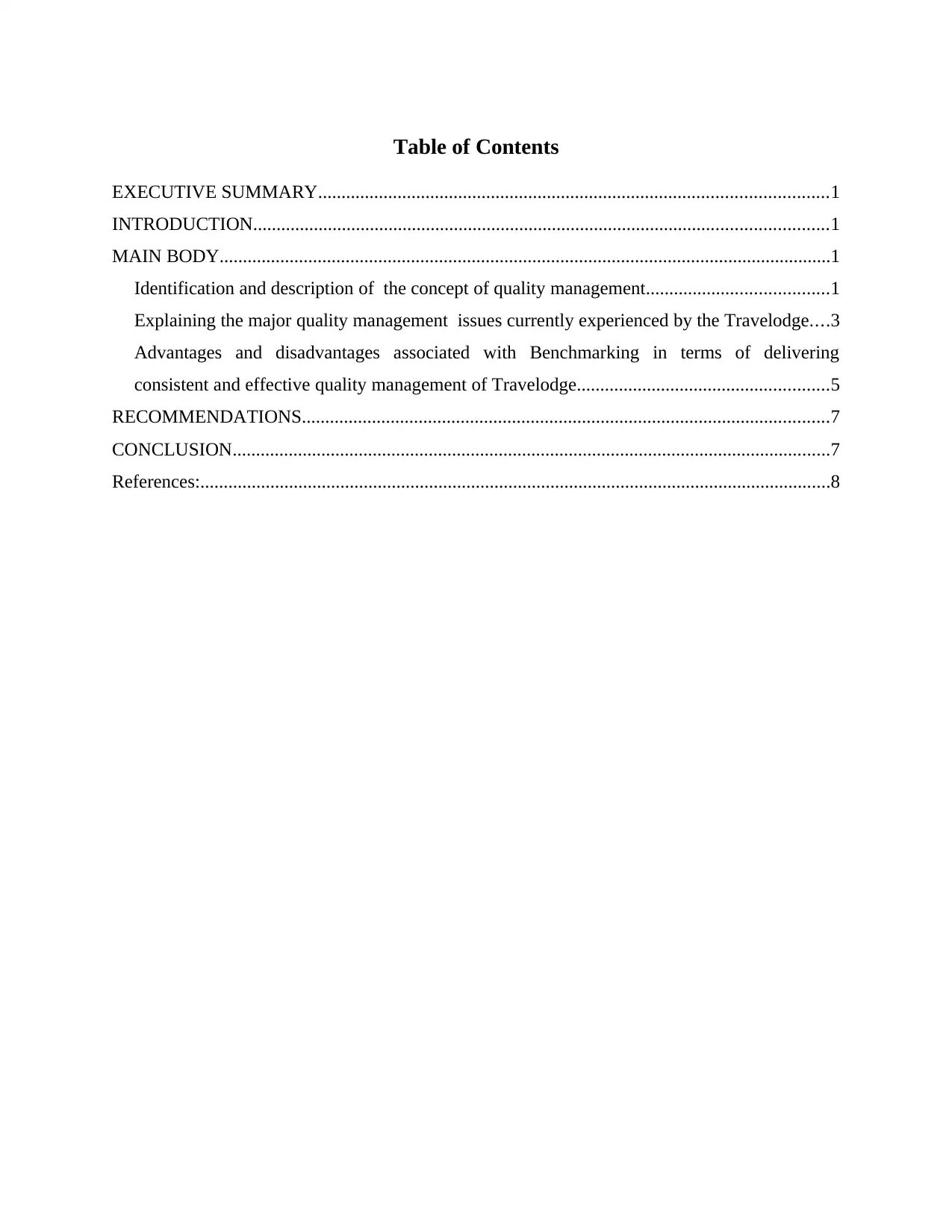
Table of Contents
EXECUTIVE SUMMARY.............................................................................................................1
INTRODUCTION...........................................................................................................................1
MAIN BODY...................................................................................................................................1
Identification and description of the concept of quality management.......................................1
Explaining the major quality management issues currently experienced by the Travelodge....3
Advantages and disadvantages associated with Benchmarking in terms of delivering
consistent and effective quality management of Travelodge......................................................5
RECOMMENDATIONS.................................................................................................................7
CONCLUSION................................................................................................................................7
References:.......................................................................................................................................8
EXECUTIVE SUMMARY.............................................................................................................1
INTRODUCTION...........................................................................................................................1
MAIN BODY...................................................................................................................................1
Identification and description of the concept of quality management.......................................1
Explaining the major quality management issues currently experienced by the Travelodge....3
Advantages and disadvantages associated with Benchmarking in terms of delivering
consistent and effective quality management of Travelodge......................................................5
RECOMMENDATIONS.................................................................................................................7
CONCLUSION................................................................................................................................7
References:.......................................................................................................................................8
⊘ This is a preview!⊘
Do you want full access?
Subscribe today to unlock all pages.

Trusted by 1+ million students worldwide
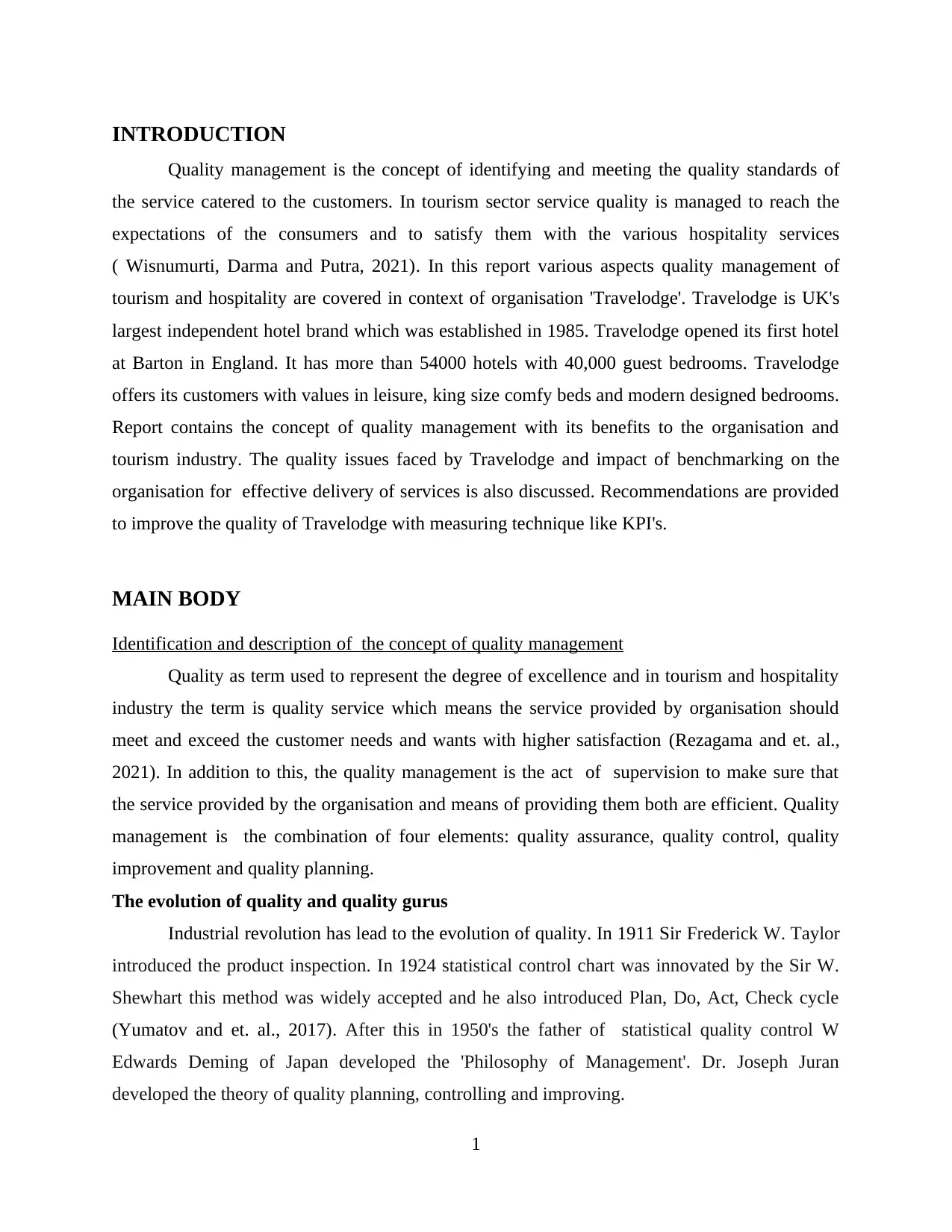
INTRODUCTION
Quality management is the concept of identifying and meeting the quality standards of
the service catered to the customers. In tourism sector service quality is managed to reach the
expectations of the consumers and to satisfy them with the various hospitality services
( Wisnumurti, Darma and Putra, 2021). In this report various aspects quality management of
tourism and hospitality are covered in context of organisation 'Travelodge'. Travelodge is UK's
largest independent hotel brand which was established in 1985. Travelodge opened its first hotel
at Barton in England. It has more than 54000 hotels with 40,000 guest bedrooms. Travelodge
offers its customers with values in leisure, king size comfy beds and modern designed bedrooms.
Report contains the concept of quality management with its benefits to the organisation and
tourism industry. The quality issues faced by Travelodge and impact of benchmarking on the
organisation for effective delivery of services is also discussed. Recommendations are provided
to improve the quality of Travelodge with measuring technique like KPI's.
MAIN BODY
Identification and description of the concept of quality management
Quality as term used to represent the degree of excellence and in tourism and hospitality
industry the term is quality service which means the service provided by organisation should
meet and exceed the customer needs and wants with higher satisfaction (Rezagama and et. al.,
2021). In addition to this, the quality management is the act of supervision to make sure that
the service provided by the organisation and means of providing them both are efficient. Quality
management is the combination of four elements: quality assurance, quality control, quality
improvement and quality planning.
The evolution of quality and quality gurus
Industrial revolution has lead to the evolution of quality. In 1911 Sir Frederick W. Taylor
introduced the product inspection. In 1924 statistical control chart was innovated by the Sir W.
Shewhart this method was widely accepted and he also introduced Plan, Do, Act, Check cycle
(Yumatov and et. al., 2017). After this in 1950's the father of statistical quality control W
Edwards Deming of Japan developed the 'Philosophy of Management'. Dr. Joseph Juran
developed the theory of quality planning, controlling and improving.
1
Quality management is the concept of identifying and meeting the quality standards of
the service catered to the customers. In tourism sector service quality is managed to reach the
expectations of the consumers and to satisfy them with the various hospitality services
( Wisnumurti, Darma and Putra, 2021). In this report various aspects quality management of
tourism and hospitality are covered in context of organisation 'Travelodge'. Travelodge is UK's
largest independent hotel brand which was established in 1985. Travelodge opened its first hotel
at Barton in England. It has more than 54000 hotels with 40,000 guest bedrooms. Travelodge
offers its customers with values in leisure, king size comfy beds and modern designed bedrooms.
Report contains the concept of quality management with its benefits to the organisation and
tourism industry. The quality issues faced by Travelodge and impact of benchmarking on the
organisation for effective delivery of services is also discussed. Recommendations are provided
to improve the quality of Travelodge with measuring technique like KPI's.
MAIN BODY
Identification and description of the concept of quality management
Quality as term used to represent the degree of excellence and in tourism and hospitality
industry the term is quality service which means the service provided by organisation should
meet and exceed the customer needs and wants with higher satisfaction (Rezagama and et. al.,
2021). In addition to this, the quality management is the act of supervision to make sure that
the service provided by the organisation and means of providing them both are efficient. Quality
management is the combination of four elements: quality assurance, quality control, quality
improvement and quality planning.
The evolution of quality and quality gurus
Industrial revolution has lead to the evolution of quality. In 1911 Sir Frederick W. Taylor
introduced the product inspection. In 1924 statistical control chart was innovated by the Sir W.
Shewhart this method was widely accepted and he also introduced Plan, Do, Act, Check cycle
(Yumatov and et. al., 2017). After this in 1950's the father of statistical quality control W
Edwards Deming of Japan developed the 'Philosophy of Management'. Dr. Joseph Juran
developed the theory of quality planning, controlling and improving.
1
Paraphrase This Document
Need a fresh take? Get an instant paraphrase of this document with our AI Paraphraser
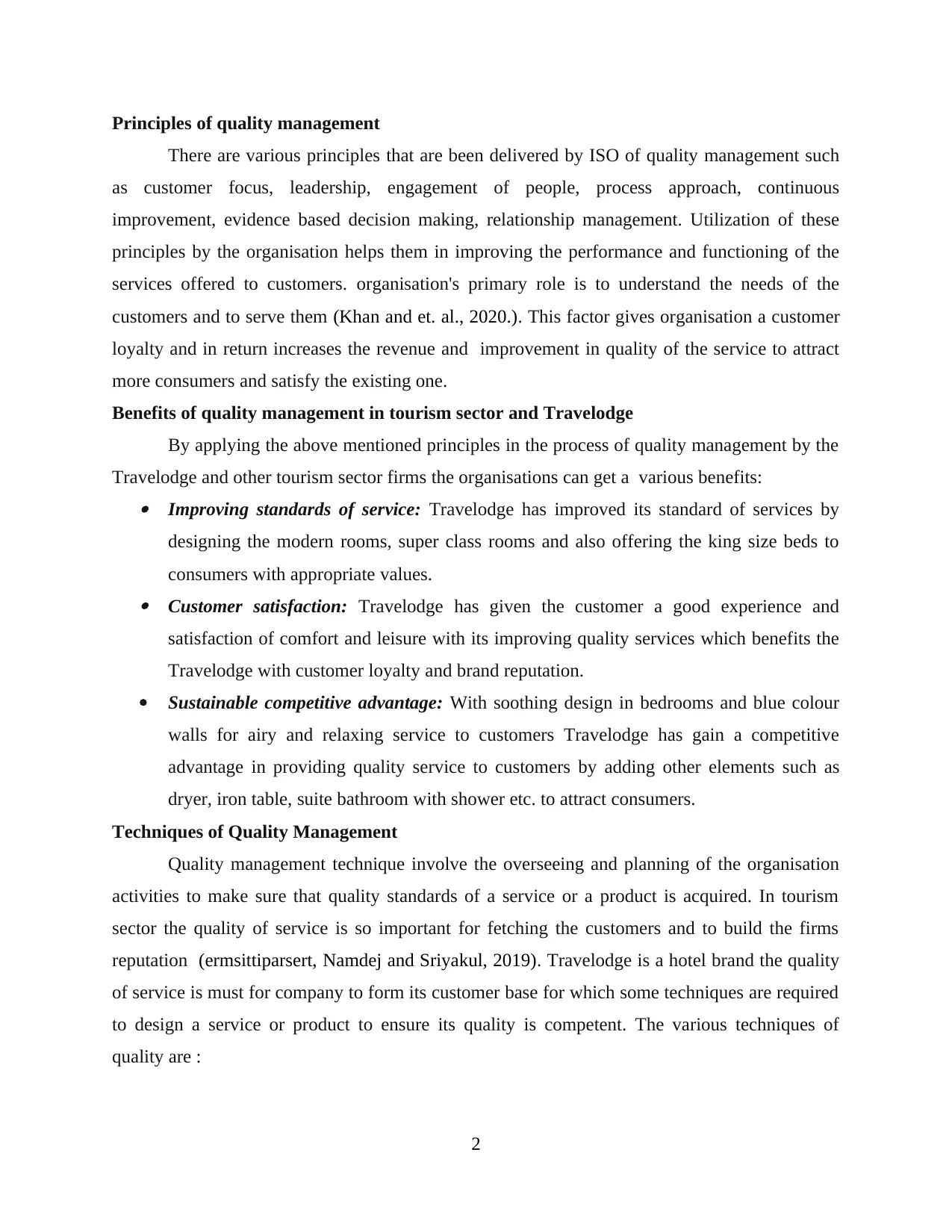
Principles of quality management
There are various principles that are been delivered by ISO of quality management such
as customer focus, leadership, engagement of people, process approach, continuous
improvement, evidence based decision making, relationship management. Utilization of these
principles by the organisation helps them in improving the performance and functioning of the
services offered to customers. organisation's primary role is to understand the needs of the
customers and to serve them (Khan and et. al., 2020.). This factor gives organisation a customer
loyalty and in return increases the revenue and improvement in quality of the service to attract
more consumers and satisfy the existing one.
Benefits of quality management in tourism sector and Travelodge
By applying the above mentioned principles in the process of quality management by the
Travelodge and other tourism sector firms the organisations can get a various benefits: Improving standards of service: Travelodge has improved its standard of services by
designing the modern rooms, super class rooms and also offering the king size beds to
consumers with appropriate values. Customer satisfaction: Travelodge has given the customer a good experience and
satisfaction of comfort and leisure with its improving quality services which benefits the
Travelodge with customer loyalty and brand reputation.
Sustainable competitive advantage: With soothing design in bedrooms and blue colour
walls for airy and relaxing service to customers Travelodge has gain a competitive
advantage in providing quality service to customers by adding other elements such as
dryer, iron table, suite bathroom with shower etc. to attract consumers.
Techniques of Quality Management
Quality management technique involve the overseeing and planning of the organisation
activities to make sure that quality standards of a service or a product is acquired. In tourism
sector the quality of service is so important for fetching the customers and to build the firms
reputation (ermsittiparsert, Namdej and Sriyakul, 2019). Travelodge is a hotel brand the quality
of service is must for company to form its customer base for which some techniques are required
to design a service or product to ensure its quality is competent. The various techniques of
quality are :
2
There are various principles that are been delivered by ISO of quality management such
as customer focus, leadership, engagement of people, process approach, continuous
improvement, evidence based decision making, relationship management. Utilization of these
principles by the organisation helps them in improving the performance and functioning of the
services offered to customers. organisation's primary role is to understand the needs of the
customers and to serve them (Khan and et. al., 2020.). This factor gives organisation a customer
loyalty and in return increases the revenue and improvement in quality of the service to attract
more consumers and satisfy the existing one.
Benefits of quality management in tourism sector and Travelodge
By applying the above mentioned principles in the process of quality management by the
Travelodge and other tourism sector firms the organisations can get a various benefits: Improving standards of service: Travelodge has improved its standard of services by
designing the modern rooms, super class rooms and also offering the king size beds to
consumers with appropriate values. Customer satisfaction: Travelodge has given the customer a good experience and
satisfaction of comfort and leisure with its improving quality services which benefits the
Travelodge with customer loyalty and brand reputation.
Sustainable competitive advantage: With soothing design in bedrooms and blue colour
walls for airy and relaxing service to customers Travelodge has gain a competitive
advantage in providing quality service to customers by adding other elements such as
dryer, iron table, suite bathroom with shower etc. to attract consumers.
Techniques of Quality Management
Quality management technique involve the overseeing and planning of the organisation
activities to make sure that quality standards of a service or a product is acquired. In tourism
sector the quality of service is so important for fetching the customers and to build the firms
reputation (ermsittiparsert, Namdej and Sriyakul, 2019). Travelodge is a hotel brand the quality
of service is must for company to form its customer base for which some techniques are required
to design a service or product to ensure its quality is competent. The various techniques of
quality are :
2
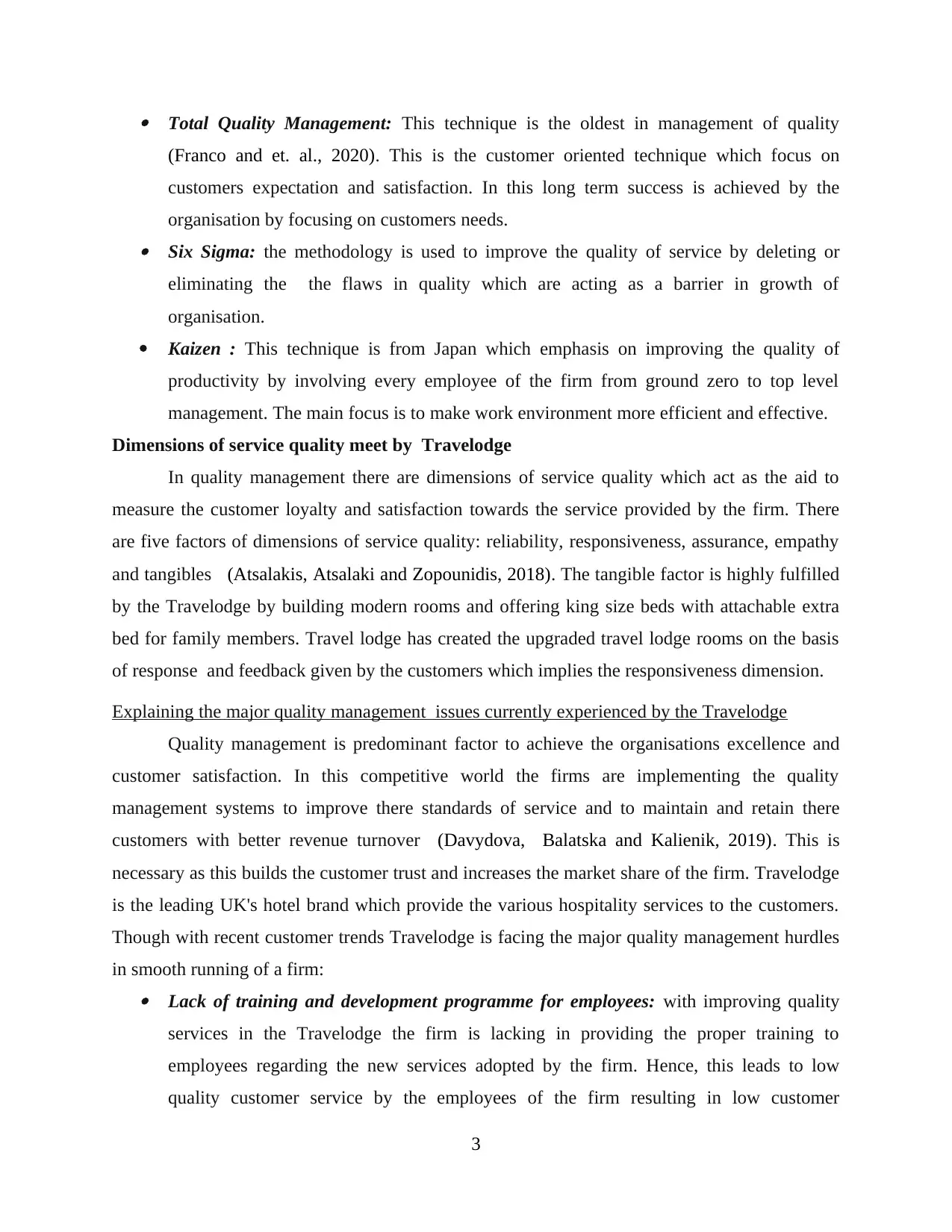
Total Quality Management: This technique is the oldest in management of quality
(Franco and et. al., 2020). This is the customer oriented technique which focus on
customers expectation and satisfaction. In this long term success is achieved by the
organisation by focusing on customers needs. Six Sigma: the methodology is used to improve the quality of service by deleting or
eliminating the the flaws in quality which are acting as a barrier in growth of
organisation.
Kaizen : This technique is from Japan which emphasis on improving the quality of
productivity by involving every employee of the firm from ground zero to top level
management. The main focus is to make work environment more efficient and effective.
Dimensions of service quality meet by Travelodge
In quality management there are dimensions of service quality which act as the aid to
measure the customer loyalty and satisfaction towards the service provided by the firm. There
are five factors of dimensions of service quality: reliability, responsiveness, assurance, empathy
and tangibles (Atsalakis, Atsalaki and Zopounidis, 2018). The tangible factor is highly fulfilled
by the Travelodge by building modern rooms and offering king size beds with attachable extra
bed for family members. Travel lodge has created the upgraded travel lodge rooms on the basis
of response and feedback given by the customers which implies the responsiveness dimension.
Explaining the major quality management issues currently experienced by the Travelodge
Quality management is predominant factor to achieve the organisations excellence and
customer satisfaction. In this competitive world the firms are implementing the quality
management systems to improve there standards of service and to maintain and retain there
customers with better revenue turnover (Davydova, Balatska and Kalienik, 2019). This is
necessary as this builds the customer trust and increases the market share of the firm. Travelodge
is the leading UK's hotel brand which provide the various hospitality services to the customers.
Though with recent customer trends Travelodge is facing the major quality management hurdles
in smooth running of a firm: Lack of training and development programme for employees: with improving quality
services in the Travelodge the firm is lacking in providing the proper training to
employees regarding the new services adopted by the firm. Hence, this leads to low
quality customer service by the employees of the firm resulting in low customer
3
(Franco and et. al., 2020). This is the customer oriented technique which focus on
customers expectation and satisfaction. In this long term success is achieved by the
organisation by focusing on customers needs. Six Sigma: the methodology is used to improve the quality of service by deleting or
eliminating the the flaws in quality which are acting as a barrier in growth of
organisation.
Kaizen : This technique is from Japan which emphasis on improving the quality of
productivity by involving every employee of the firm from ground zero to top level
management. The main focus is to make work environment more efficient and effective.
Dimensions of service quality meet by Travelodge
In quality management there are dimensions of service quality which act as the aid to
measure the customer loyalty and satisfaction towards the service provided by the firm. There
are five factors of dimensions of service quality: reliability, responsiveness, assurance, empathy
and tangibles (Atsalakis, Atsalaki and Zopounidis, 2018). The tangible factor is highly fulfilled
by the Travelodge by building modern rooms and offering king size beds with attachable extra
bed for family members. Travel lodge has created the upgraded travel lodge rooms on the basis
of response and feedback given by the customers which implies the responsiveness dimension.
Explaining the major quality management issues currently experienced by the Travelodge
Quality management is predominant factor to achieve the organisations excellence and
customer satisfaction. In this competitive world the firms are implementing the quality
management systems to improve there standards of service and to maintain and retain there
customers with better revenue turnover (Davydova, Balatska and Kalienik, 2019). This is
necessary as this builds the customer trust and increases the market share of the firm. Travelodge
is the leading UK's hotel brand which provide the various hospitality services to the customers.
Though with recent customer trends Travelodge is facing the major quality management hurdles
in smooth running of a firm: Lack of training and development programme for employees: with improving quality
services in the Travelodge the firm is lacking in providing the proper training to
employees regarding the new services adopted by the firm. Hence, this leads to low
quality customer service by the employees of the firm resulting in low customer
3
⊘ This is a preview!⊘
Do you want full access?
Subscribe today to unlock all pages.

Trusted by 1+ million students worldwide
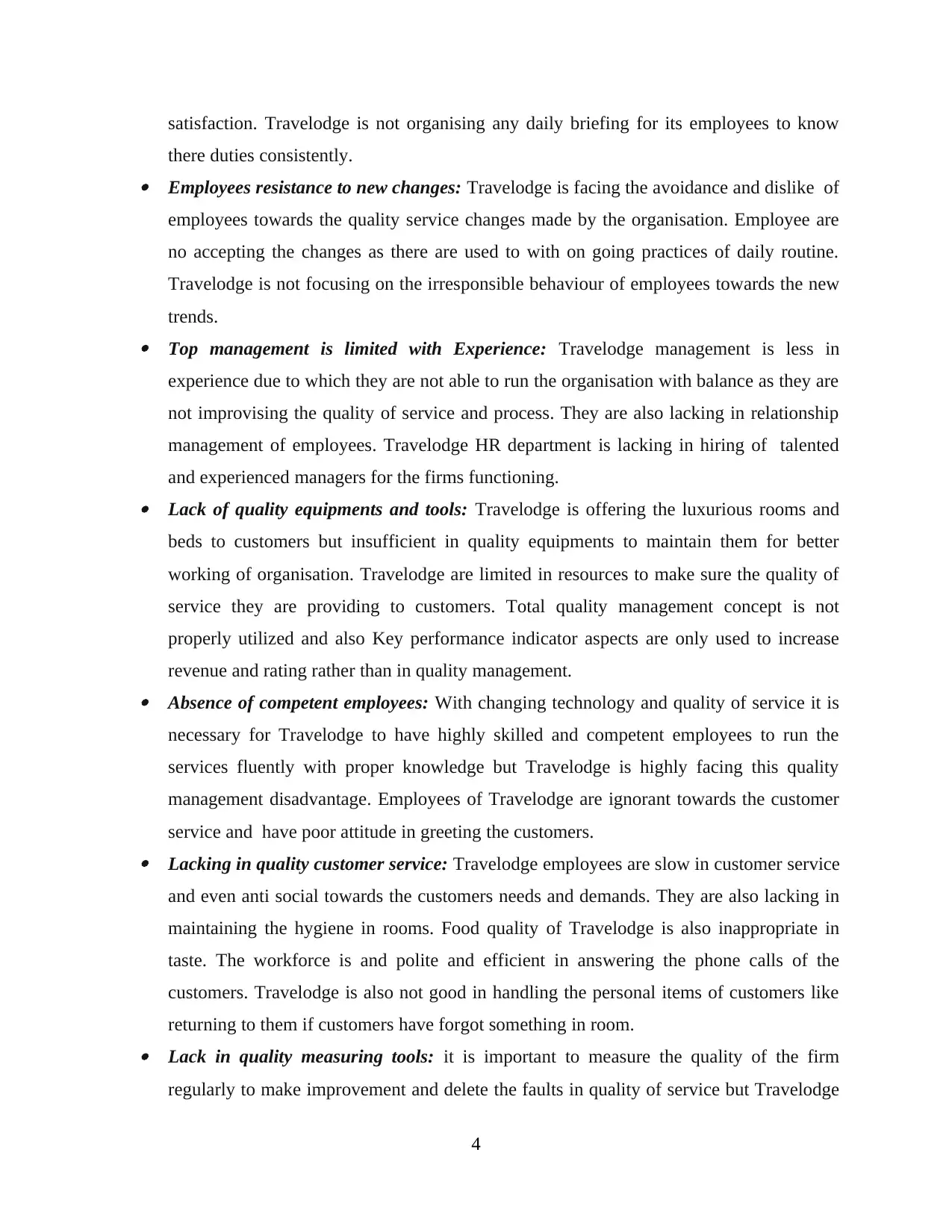
satisfaction. Travelodge is not organising any daily briefing for its employees to know
there duties consistently. Employees resistance to new changes: Travelodge is facing the avoidance and dislike of
employees towards the quality service changes made by the organisation. Employee are
no accepting the changes as there are used to with on going practices of daily routine.
Travelodge is not focusing on the irresponsible behaviour of employees towards the new
trends. Top management is limited with Experience: Travelodge management is less in
experience due to which they are not able to run the organisation with balance as they are
not improvising the quality of service and process. They are also lacking in relationship
management of employees. Travelodge HR department is lacking in hiring of talented
and experienced managers for the firms functioning. Lack of quality equipments and tools: Travelodge is offering the luxurious rooms and
beds to customers but insufficient in quality equipments to maintain them for better
working of organisation. Travelodge are limited in resources to make sure the quality of
service they are providing to customers. Total quality management concept is not
properly utilized and also Key performance indicator aspects are only used to increase
revenue and rating rather than in quality management. Absence of competent employees: With changing technology and quality of service it is
necessary for Travelodge to have highly skilled and competent employees to run the
services fluently with proper knowledge but Travelodge is highly facing this quality
management disadvantage. Employees of Travelodge are ignorant towards the customer
service and have poor attitude in greeting the customers. Lacking in quality customer service: Travelodge employees are slow in customer service
and even anti social towards the customers needs and demands. They are also lacking in
maintaining the hygiene in rooms. Food quality of Travelodge is also inappropriate in
taste. The workforce is and polite and efficient in answering the phone calls of the
customers. Travelodge is also not good in handling the personal items of customers like
returning to them if customers have forgot something in room. Lack in quality measuring tools: it is important to measure the quality of the firm
regularly to make improvement and delete the faults in quality of service but Travelodge
4
there duties consistently. Employees resistance to new changes: Travelodge is facing the avoidance and dislike of
employees towards the quality service changes made by the organisation. Employee are
no accepting the changes as there are used to with on going practices of daily routine.
Travelodge is not focusing on the irresponsible behaviour of employees towards the new
trends. Top management is limited with Experience: Travelodge management is less in
experience due to which they are not able to run the organisation with balance as they are
not improvising the quality of service and process. They are also lacking in relationship
management of employees. Travelodge HR department is lacking in hiring of talented
and experienced managers for the firms functioning. Lack of quality equipments and tools: Travelodge is offering the luxurious rooms and
beds to customers but insufficient in quality equipments to maintain them for better
working of organisation. Travelodge are limited in resources to make sure the quality of
service they are providing to customers. Total quality management concept is not
properly utilized and also Key performance indicator aspects are only used to increase
revenue and rating rather than in quality management. Absence of competent employees: With changing technology and quality of service it is
necessary for Travelodge to have highly skilled and competent employees to run the
services fluently with proper knowledge but Travelodge is highly facing this quality
management disadvantage. Employees of Travelodge are ignorant towards the customer
service and have poor attitude in greeting the customers. Lacking in quality customer service: Travelodge employees are slow in customer service
and even anti social towards the customers needs and demands. They are also lacking in
maintaining the hygiene in rooms. Food quality of Travelodge is also inappropriate in
taste. The workforce is and polite and efficient in answering the phone calls of the
customers. Travelodge is also not good in handling the personal items of customers like
returning to them if customers have forgot something in room. Lack in quality measuring tools: it is important to measure the quality of the firm
regularly to make improvement and delete the faults in quality of service but Travelodge
4
Paraphrase This Document
Need a fresh take? Get an instant paraphrase of this document with our AI Paraphraser
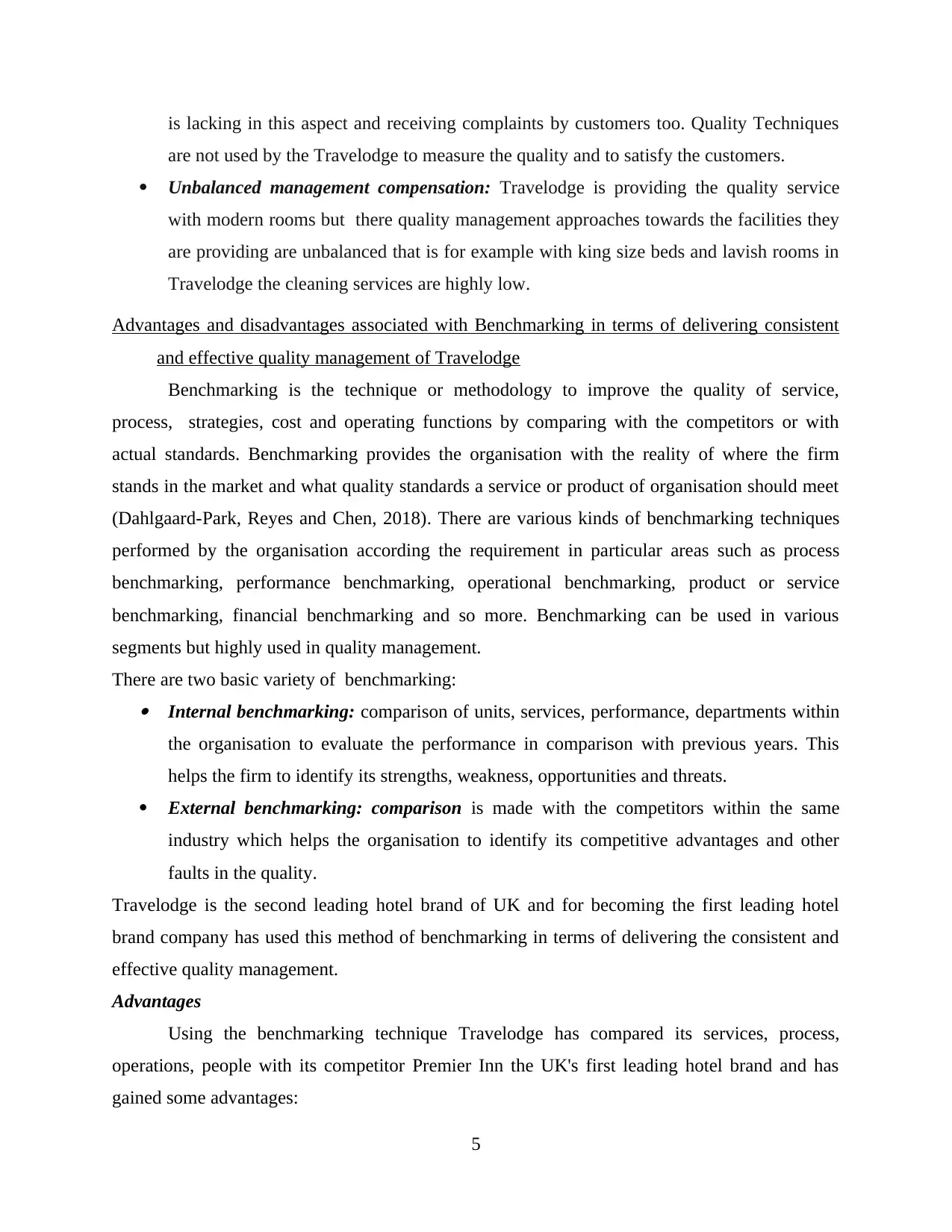
is lacking in this aspect and receiving complaints by customers too. Quality Techniques
are not used by the Travelodge to measure the quality and to satisfy the customers.
Unbalanced management compensation: Travelodge is providing the quality service
with modern rooms but there quality management approaches towards the facilities they
are providing are unbalanced that is for example with king size beds and lavish rooms in
Travelodge the cleaning services are highly low.
Advantages and disadvantages associated with Benchmarking in terms of delivering consistent
and effective quality management of Travelodge
Benchmarking is the technique or methodology to improve the quality of service,
process, strategies, cost and operating functions by comparing with the competitors or with
actual standards. Benchmarking provides the organisation with the reality of where the firm
stands in the market and what quality standards a service or product of organisation should meet
(Dahlgaard-Park, Reyes and Chen, 2018). There are various kinds of benchmarking techniques
performed by the organisation according the requirement in particular areas such as process
benchmarking, performance benchmarking, operational benchmarking, product or service
benchmarking, financial benchmarking and so more. Benchmarking can be used in various
segments but highly used in quality management.
There are two basic variety of benchmarking: Internal benchmarking: comparison of units, services, performance, departments within
the organisation to evaluate the performance in comparison with previous years. This
helps the firm to identify its strengths, weakness, opportunities and threats.
External benchmarking: comparison is made with the competitors within the same
industry which helps the organisation to identify its competitive advantages and other
faults in the quality.
Travelodge is the second leading hotel brand of UK and for becoming the first leading hotel
brand company has used this method of benchmarking in terms of delivering the consistent and
effective quality management.
Advantages
Using the benchmarking technique Travelodge has compared its services, process,
operations, people with its competitor Premier Inn the UK's first leading hotel brand and has
gained some advantages:
5
are not used by the Travelodge to measure the quality and to satisfy the customers.
Unbalanced management compensation: Travelodge is providing the quality service
with modern rooms but there quality management approaches towards the facilities they
are providing are unbalanced that is for example with king size beds and lavish rooms in
Travelodge the cleaning services are highly low.
Advantages and disadvantages associated with Benchmarking in terms of delivering consistent
and effective quality management of Travelodge
Benchmarking is the technique or methodology to improve the quality of service,
process, strategies, cost and operating functions by comparing with the competitors or with
actual standards. Benchmarking provides the organisation with the reality of where the firm
stands in the market and what quality standards a service or product of organisation should meet
(Dahlgaard-Park, Reyes and Chen, 2018). There are various kinds of benchmarking techniques
performed by the organisation according the requirement in particular areas such as process
benchmarking, performance benchmarking, operational benchmarking, product or service
benchmarking, financial benchmarking and so more. Benchmarking can be used in various
segments but highly used in quality management.
There are two basic variety of benchmarking: Internal benchmarking: comparison of units, services, performance, departments within
the organisation to evaluate the performance in comparison with previous years. This
helps the firm to identify its strengths, weakness, opportunities and threats.
External benchmarking: comparison is made with the competitors within the same
industry which helps the organisation to identify its competitive advantages and other
faults in the quality.
Travelodge is the second leading hotel brand of UK and for becoming the first leading hotel
brand company has used this method of benchmarking in terms of delivering the consistent and
effective quality management.
Advantages
Using the benchmarking technique Travelodge has compared its services, process,
operations, people with its competitor Premier Inn the UK's first leading hotel brand and has
gained some advantages:
5
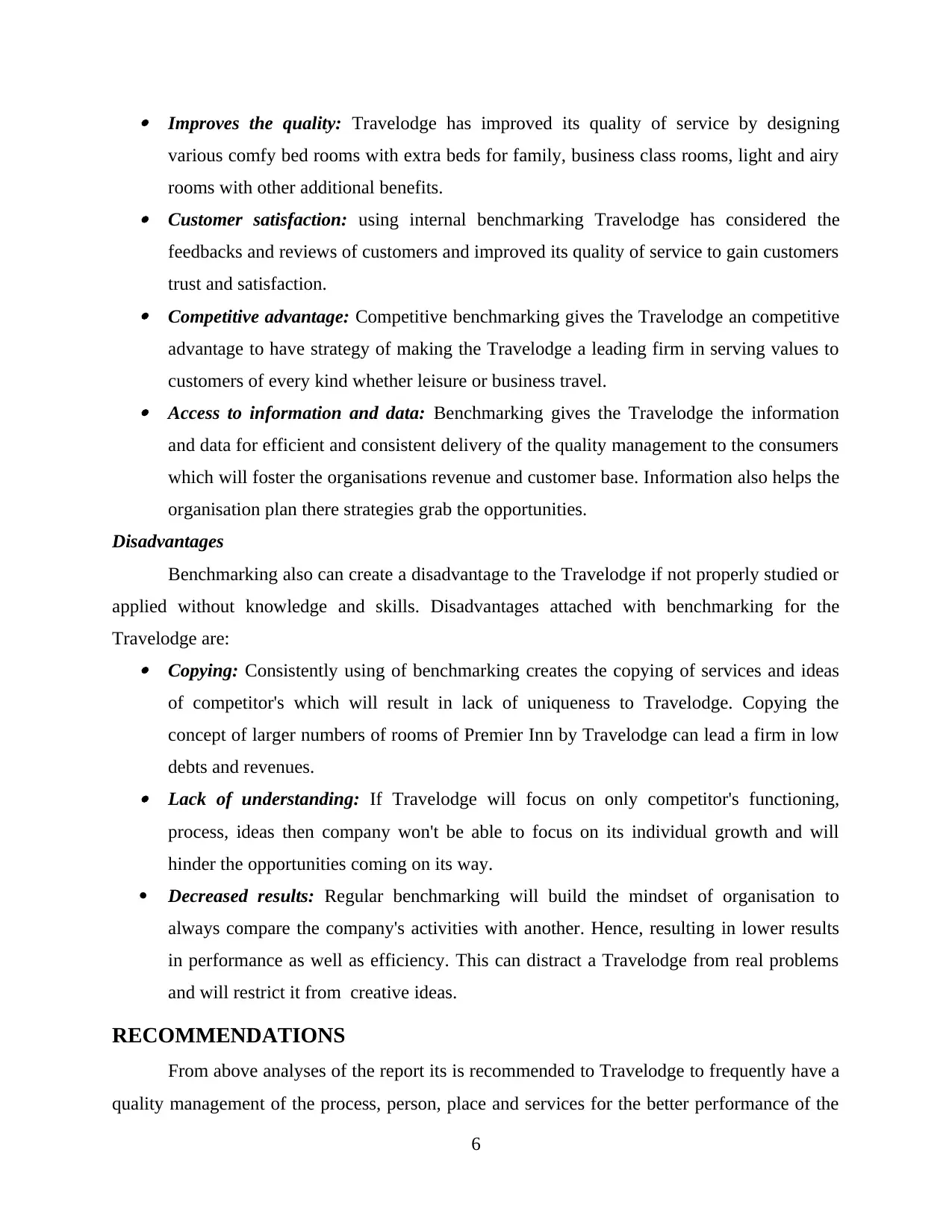
Improves the quality: Travelodge has improved its quality of service by designing
various comfy bed rooms with extra beds for family, business class rooms, light and airy
rooms with other additional benefits. Customer satisfaction: using internal benchmarking Travelodge has considered the
feedbacks and reviews of customers and improved its quality of service to gain customers
trust and satisfaction. Competitive advantage: Competitive benchmarking gives the Travelodge an competitive
advantage to have strategy of making the Travelodge a leading firm in serving values to
customers of every kind whether leisure or business travel. Access to information and data: Benchmarking gives the Travelodge the information
and data for efficient and consistent delivery of the quality management to the consumers
which will foster the organisations revenue and customer base. Information also helps the
organisation plan there strategies grab the opportunities.
Disadvantages
Benchmarking also can create a disadvantage to the Travelodge if not properly studied or
applied without knowledge and skills. Disadvantages attached with benchmarking for the
Travelodge are: Copying: Consistently using of benchmarking creates the copying of services and ideas
of competitor's which will result in lack of uniqueness to Travelodge. Copying the
concept of larger numbers of rooms of Premier Inn by Travelodge can lead a firm in low
debts and revenues. Lack of understanding: If Travelodge will focus on only competitor's functioning,
process, ideas then company won't be able to focus on its individual growth and will
hinder the opportunities coming on its way.
Decreased results: Regular benchmarking will build the mindset of organisation to
always compare the company's activities with another. Hence, resulting in lower results
in performance as well as efficiency. This can distract a Travelodge from real problems
and will restrict it from creative ideas.
RECOMMENDATIONS
From above analyses of the report its is recommended to Travelodge to frequently have a
quality management of the process, person, place and services for the better performance of the
6
various comfy bed rooms with extra beds for family, business class rooms, light and airy
rooms with other additional benefits. Customer satisfaction: using internal benchmarking Travelodge has considered the
feedbacks and reviews of customers and improved its quality of service to gain customers
trust and satisfaction. Competitive advantage: Competitive benchmarking gives the Travelodge an competitive
advantage to have strategy of making the Travelodge a leading firm in serving values to
customers of every kind whether leisure or business travel. Access to information and data: Benchmarking gives the Travelodge the information
and data for efficient and consistent delivery of the quality management to the consumers
which will foster the organisations revenue and customer base. Information also helps the
organisation plan there strategies grab the opportunities.
Disadvantages
Benchmarking also can create a disadvantage to the Travelodge if not properly studied or
applied without knowledge and skills. Disadvantages attached with benchmarking for the
Travelodge are: Copying: Consistently using of benchmarking creates the copying of services and ideas
of competitor's which will result in lack of uniqueness to Travelodge. Copying the
concept of larger numbers of rooms of Premier Inn by Travelodge can lead a firm in low
debts and revenues. Lack of understanding: If Travelodge will focus on only competitor's functioning,
process, ideas then company won't be able to focus on its individual growth and will
hinder the opportunities coming on its way.
Decreased results: Regular benchmarking will build the mindset of organisation to
always compare the company's activities with another. Hence, resulting in lower results
in performance as well as efficiency. This can distract a Travelodge from real problems
and will restrict it from creative ideas.
RECOMMENDATIONS
From above analyses of the report its is recommended to Travelodge to frequently have a
quality management of the process, person, place and services for the better performance of the
6
⊘ This is a preview!⊘
Do you want full access?
Subscribe today to unlock all pages.

Trusted by 1+ million students worldwide
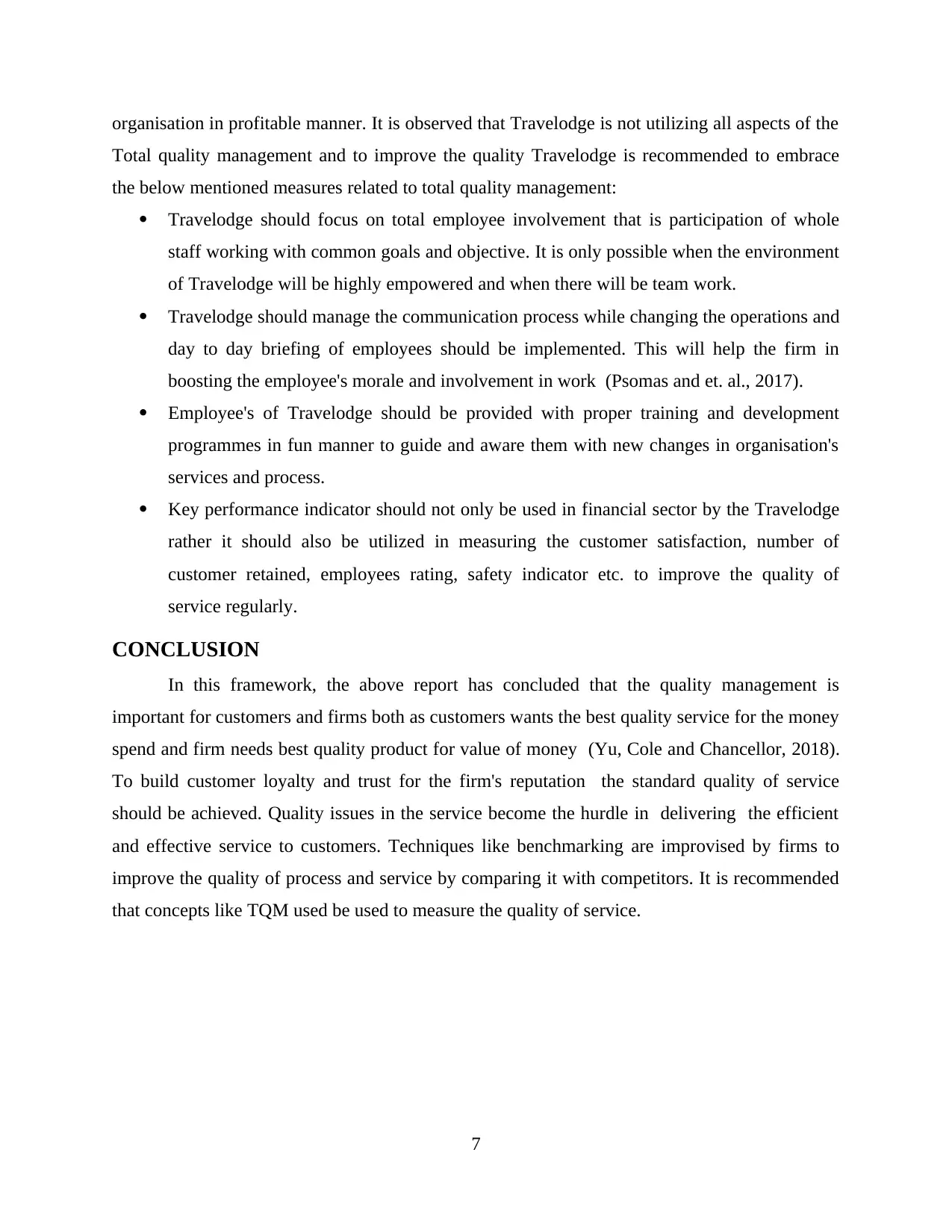
organisation in profitable manner. It is observed that Travelodge is not utilizing all aspects of the
Total quality management and to improve the quality Travelodge is recommended to embrace
the below mentioned measures related to total quality management:
Travelodge should focus on total employee involvement that is participation of whole
staff working with common goals and objective. It is only possible when the environment
of Travelodge will be highly empowered and when there will be team work.
Travelodge should manage the communication process while changing the operations and
day to day briefing of employees should be implemented. This will help the firm in
boosting the employee's morale and involvement in work (Psomas and et. al., 2017).
Employee's of Travelodge should be provided with proper training and development
programmes in fun manner to guide and aware them with new changes in organisation's
services and process.
Key performance indicator should not only be used in financial sector by the Travelodge
rather it should also be utilized in measuring the customer satisfaction, number of
customer retained, employees rating, safety indicator etc. to improve the quality of
service regularly.
CONCLUSION
In this framework, the above report has concluded that the quality management is
important for customers and firms both as customers wants the best quality service for the money
spend and firm needs best quality product for value of money (Yu, Cole and Chancellor, 2018).
To build customer loyalty and trust for the firm's reputation the standard quality of service
should be achieved. Quality issues in the service become the hurdle in delivering the efficient
and effective service to customers. Techniques like benchmarking are improvised by firms to
improve the quality of process and service by comparing it with competitors. It is recommended
that concepts like TQM used be used to measure the quality of service.
7
Total quality management and to improve the quality Travelodge is recommended to embrace
the below mentioned measures related to total quality management:
Travelodge should focus on total employee involvement that is participation of whole
staff working with common goals and objective. It is only possible when the environment
of Travelodge will be highly empowered and when there will be team work.
Travelodge should manage the communication process while changing the operations and
day to day briefing of employees should be implemented. This will help the firm in
boosting the employee's morale and involvement in work (Psomas and et. al., 2017).
Employee's of Travelodge should be provided with proper training and development
programmes in fun manner to guide and aware them with new changes in organisation's
services and process.
Key performance indicator should not only be used in financial sector by the Travelodge
rather it should also be utilized in measuring the customer satisfaction, number of
customer retained, employees rating, safety indicator etc. to improve the quality of
service regularly.
CONCLUSION
In this framework, the above report has concluded that the quality management is
important for customers and firms both as customers wants the best quality service for the money
spend and firm needs best quality product for value of money (Yu, Cole and Chancellor, 2018).
To build customer loyalty and trust for the firm's reputation the standard quality of service
should be achieved. Quality issues in the service become the hurdle in delivering the efficient
and effective service to customers. Techniques like benchmarking are improvised by firms to
improve the quality of process and service by comparing it with competitors. It is recommended
that concepts like TQM used be used to measure the quality of service.
7
Paraphrase This Document
Need a fresh take? Get an instant paraphrase of this document with our AI Paraphraser
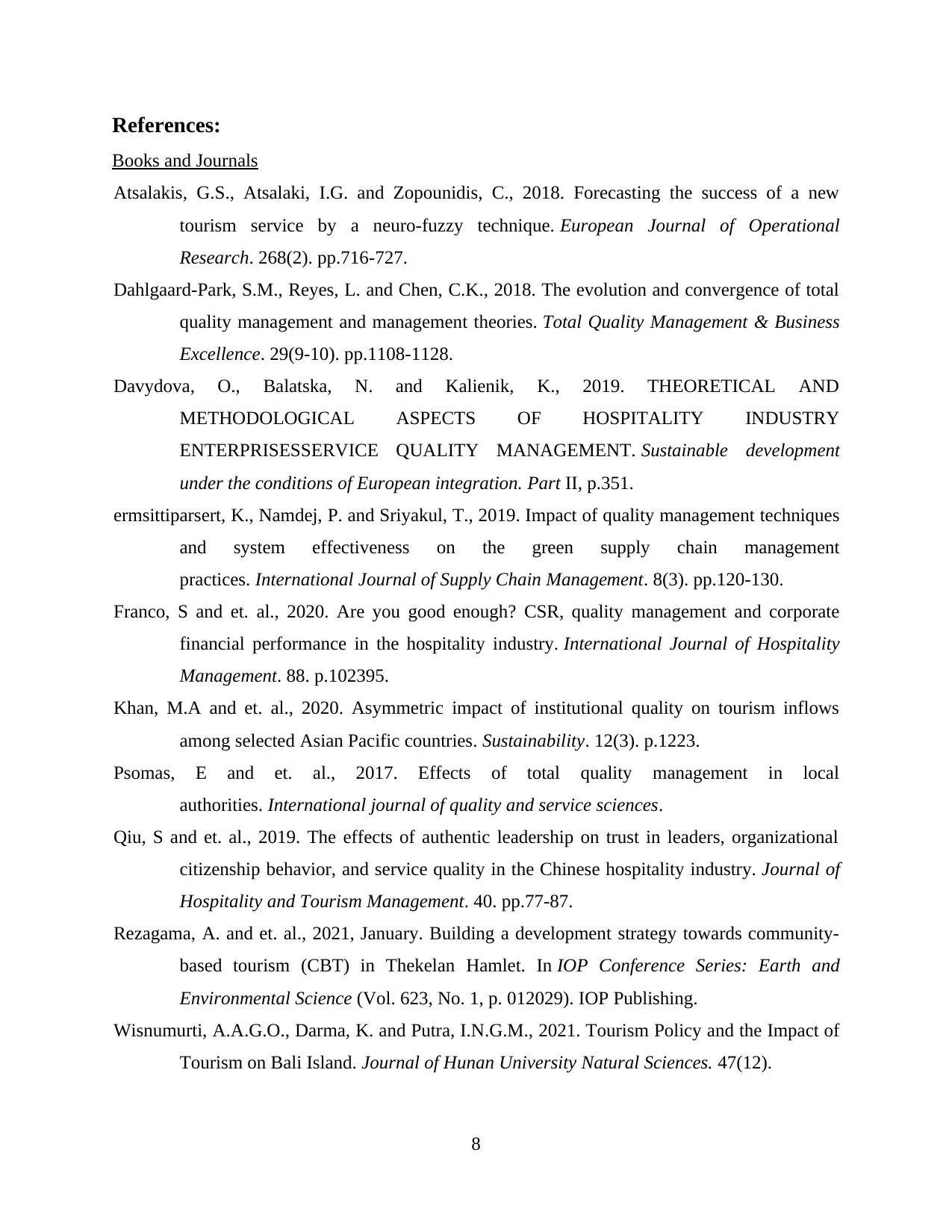
References:
Books and Journals
Atsalakis, G.S., Atsalaki, I.G. and Zopounidis, C., 2018. Forecasting the success of a new
tourism service by a neuro-fuzzy technique. European Journal of Operational
Research. 268(2). pp.716-727.
Dahlgaard-Park, S.M., Reyes, L. and Chen, C.K., 2018. The evolution and convergence of total
quality management and management theories. Total Quality Management & Business
Excellence. 29(9-10). pp.1108-1128.
Davydova, O., Balatska, N. and Kalienik, K., 2019. THEORETICAL AND
METHODOLOGICAL ASPECTS OF HOSPITALITY INDUSTRY
ENTERPRISESSERVICE QUALITY MANAGEMENT. Sustainable development
under the conditions of European integration. Part II, p.351.
ermsittiparsert, K., Namdej, P. and Sriyakul, T., 2019. Impact of quality management techniques
and system effectiveness on the green supply chain management
practices. International Journal of Supply Chain Management. 8(3). pp.120-130.
Franco, S and et. al., 2020. Are you good enough? CSR, quality management and corporate
financial performance in the hospitality industry. International Journal of Hospitality
Management. 88. p.102395.
Khan, M.A and et. al., 2020. Asymmetric impact of institutional quality on tourism inflows
among selected Asian Pacific countries. Sustainability. 12(3). p.1223.
Psomas, E and et. al., 2017. Effects of total quality management in local
authorities. International journal of quality and service sciences.
Qiu, S and et. al., 2019. The effects of authentic leadership on trust in leaders, organizational
citizenship behavior, and service quality in the Chinese hospitality industry. Journal of
Hospitality and Tourism Management. 40. pp.77-87.
Rezagama, A. and et. al., 2021, January. Building a development strategy towards community-
based tourism (CBT) in Thekelan Hamlet. In IOP Conference Series: Earth and
Environmental Science (Vol. 623, No. 1, p. 012029). IOP Publishing.
Wisnumurti, A.A.G.O., Darma, K. and Putra, I.N.G.M., 2021. Tourism Policy and the Impact of
Tourism on Bali Island. Journal of Hunan University Natural Sciences. 47(12).
8
Books and Journals
Atsalakis, G.S., Atsalaki, I.G. and Zopounidis, C., 2018. Forecasting the success of a new
tourism service by a neuro-fuzzy technique. European Journal of Operational
Research. 268(2). pp.716-727.
Dahlgaard-Park, S.M., Reyes, L. and Chen, C.K., 2018. The evolution and convergence of total
quality management and management theories. Total Quality Management & Business
Excellence. 29(9-10). pp.1108-1128.
Davydova, O., Balatska, N. and Kalienik, K., 2019. THEORETICAL AND
METHODOLOGICAL ASPECTS OF HOSPITALITY INDUSTRY
ENTERPRISESSERVICE QUALITY MANAGEMENT. Sustainable development
under the conditions of European integration. Part II, p.351.
ermsittiparsert, K., Namdej, P. and Sriyakul, T., 2019. Impact of quality management techniques
and system effectiveness on the green supply chain management
practices. International Journal of Supply Chain Management. 8(3). pp.120-130.
Franco, S and et. al., 2020. Are you good enough? CSR, quality management and corporate
financial performance in the hospitality industry. International Journal of Hospitality
Management. 88. p.102395.
Khan, M.A and et. al., 2020. Asymmetric impact of institutional quality on tourism inflows
among selected Asian Pacific countries. Sustainability. 12(3). p.1223.
Psomas, E and et. al., 2017. Effects of total quality management in local
authorities. International journal of quality and service sciences.
Qiu, S and et. al., 2019. The effects of authentic leadership on trust in leaders, organizational
citizenship behavior, and service quality in the Chinese hospitality industry. Journal of
Hospitality and Tourism Management. 40. pp.77-87.
Rezagama, A. and et. al., 2021, January. Building a development strategy towards community-
based tourism (CBT) in Thekelan Hamlet. In IOP Conference Series: Earth and
Environmental Science (Vol. 623, No. 1, p. 012029). IOP Publishing.
Wisnumurti, A.A.G.O., Darma, K. and Putra, I.N.G.M., 2021. Tourism Policy and the Impact of
Tourism on Bali Island. Journal of Hunan University Natural Sciences. 47(12).
8
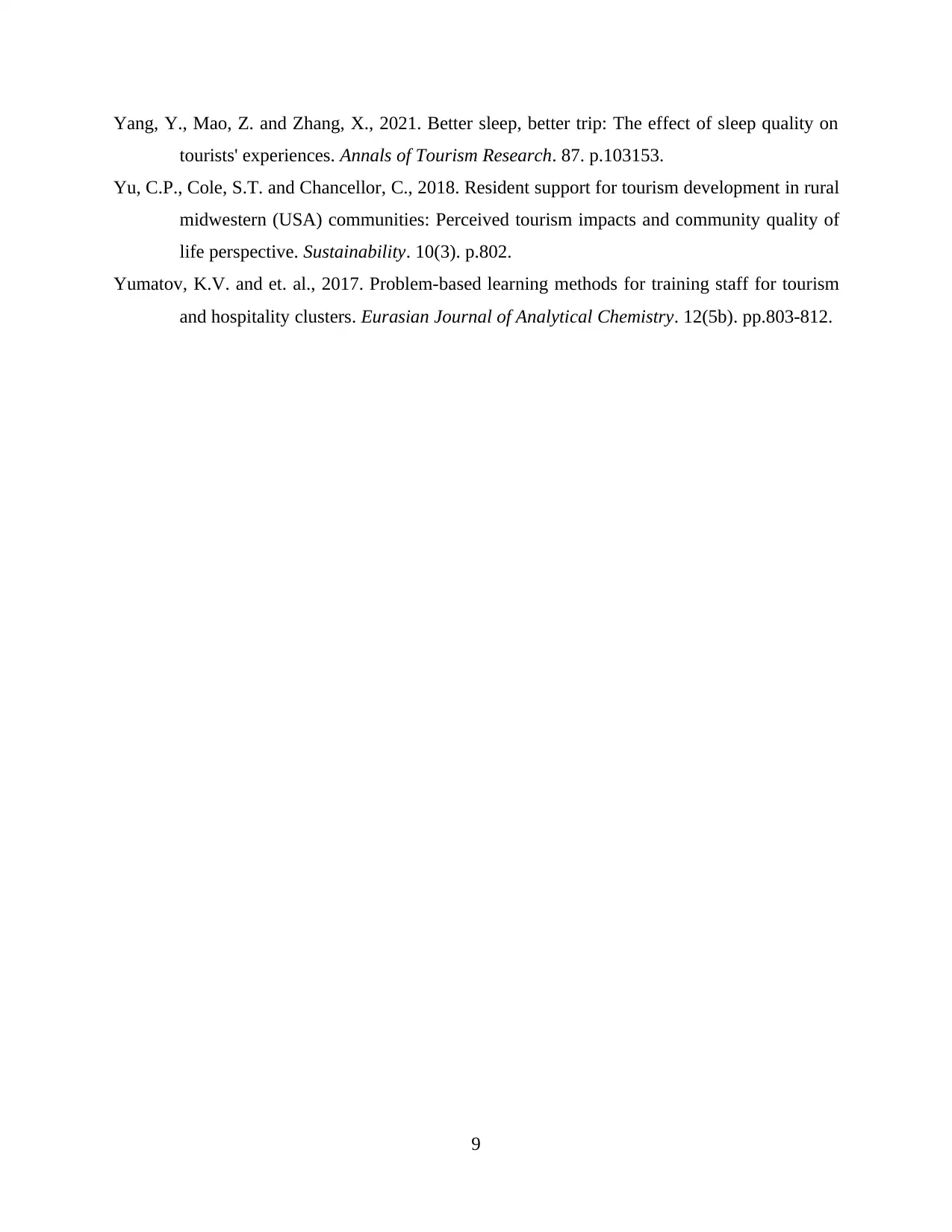
Yang, Y., Mao, Z. and Zhang, X., 2021. Better sleep, better trip: The effect of sleep quality on
tourists' experiences. Annals of Tourism Research. 87. p.103153.
Yu, C.P., Cole, S.T. and Chancellor, C., 2018. Resident support for tourism development in rural
midwestern (USA) communities: Perceived tourism impacts and community quality of
life perspective. Sustainability. 10(3). p.802.
Yumatov, K.V. and et. al., 2017. Problem-based learning methods for training staff for tourism
and hospitality clusters. Eurasian Journal of Analytical Chemistry. 12(5b). pp.803-812.
9
tourists' experiences. Annals of Tourism Research. 87. p.103153.
Yu, C.P., Cole, S.T. and Chancellor, C., 2018. Resident support for tourism development in rural
midwestern (USA) communities: Perceived tourism impacts and community quality of
life perspective. Sustainability. 10(3). p.802.
Yumatov, K.V. and et. al., 2017. Problem-based learning methods for training staff for tourism
and hospitality clusters. Eurasian Journal of Analytical Chemistry. 12(5b). pp.803-812.
9
⊘ This is a preview!⊘
Do you want full access?
Subscribe today to unlock all pages.

Trusted by 1+ million students worldwide
1 out of 12
Related Documents
Your All-in-One AI-Powered Toolkit for Academic Success.
+13062052269
info@desklib.com
Available 24*7 on WhatsApp / Email
![[object Object]](/_next/static/media/star-bottom.7253800d.svg)
Unlock your academic potential
Copyright © 2020–2026 A2Z Services. All Rights Reserved. Developed and managed by ZUCOL.





